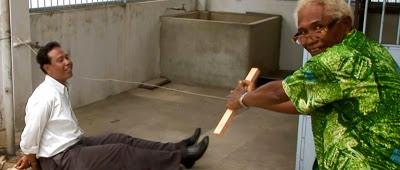Format: Streaming video from NetFlix on laptop.

The Act of Killing is not what would typically be thought of as a horror film because there is nothing supernatural on hand for us. Hell, it’s not even fiction. Because of this, because the horrors that we are seeing, while simulated and not truly real, are all the more terrible because these are reconstructions of what really happened. The idea of the film—mass killings and executions not from the perspective of the villains but from those who committed the acts of atrocity is unique in my experience, although there are certainly moments of this in a film like Shoah. This is a more than sobering experience. This is a true show of horror and terror, one that I think it is impossible to watch without being deeply affected and without walking away with a strong feeling of revulsion.
I’m going to do my best not to wax to philosophic when discussing this film, but that might be completely impossible. The Act of Killing is evidence that nothing we can create in fiction as a species, no horror we can concoct can match that which we are capable of in reality. “Man’s inhumanity to Man” doesn’t begin to cover it. And see, there I go waxing philosophic in the very paragraph where I said I would try not to. That these dangers are still real and these events still happen is evidenced by the number of people who worked on this film credited as “Anonymous,” afraid of reprisals even now, fifty years after the events depicted.
Specifically, this documentary is about the gangs of murderers and gangsters that ran rampant in Indonesia in the mid-1960s. To tell the story quickly, in the mid-1960s, the Sukarno regime in Indonesia was supplanted by the rule of a man named Sukarno. Gangsters, mobsters, and low-level thugs making money by scalping theater tickets were suddenly in demand as anti-communist death squad members. Two of the men we follow in this film, Anwar Congo and Adi Zulkadry, led the most powerful squads in northern Sumatra. All told, approximately half a million people were executed in what was ostensibly anti-communist raids and retaliation. Anwar Congo is alleged to have killed as many as 1,000 people personally, many by strangulation with wire.
Today, both of these men live openly in Indonesia with no threat of reprisals or action being brought against them. Congo in particular is viewed as one of the founding members of Pemuda Pancasila, a para-military organization that continues to work against any perceived communist threat. This organization is powerful enough that members of the government are openly members and the various forms of corruption, including direct extortion (much of which is shown on camera), election rigging, and the like happen in the open with full government approval.
Throughout the film, many of the men involved in the mass killings and a number of their friends, neighbors, and hangers-on are asked to participate in retellings of many of these events—butchery, killings, arson, and other crimes against humanity. As the film continues, those men responsible begin, at times, to feel something like remorse for their past, or at least something akin to regret. Anwar Congo, in particular, becomes greatly affected by his past when asked to play the part of a victim being strangled with wire.
A film like The Act of Killing is not an easy thing to watch. What is most startling is not the regret felt by Congo, but the complete lack of any empathy from the bulk of the men. They openly brag about murder and rape, laughing it off as just something they did in the past, at times openly contemptuous and without pity regarding their victims.
If nothing else, The Act of Killing serves as a well-made but ugly reminder that those things we would like to consign to the dark and unpleasant past of our species still go on to this day. We hear cries of “Never again” while witnessing acts of genocide still occurring around the globe. And again, it is not the acts themselves that are truly terrifying, but the utter lack of remorse from those responsible. One gets the impression that for many of these men, given the opportunity or the perceived need, they would happily do the same thing again and still sleep perfectly at night.
I cannot say that this was a film that I enjoyed watching, but I can say that I may well be a better person for having seen it. I cannot imagine what sort of person could see this film and not be deeply affected by what happens on the screen. The Act of Killing is a bitter medicine, but one that needs to be taken by most of humanity. We need to see these stories and to know that these things happen, if only to remind ourselves that complacency from us does nothing to prevent this sort of atrocity from happening. We need to be told how terrible we can be to guard against the reality of becoming that terrible thing.
Why to watch The Act of Killing: Stories like this need to be told and understood so that we can do everything to prevent them from happening again.
Why not to watch: This is the sort of thing that will haunt you for the rest of your life.
